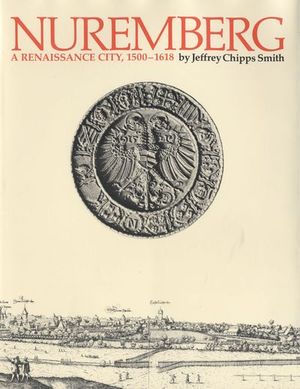Nuremberg, a Renaissance City, 1500–1618
Published by University of Texas Press
This illustrated study of Renaissance Nuremberg explores the city’s social and artistic history through the sixteenth century and beyond.
The German city of Nuremberg reached the height of its artistic brilliance during the Renaissance, becoming one of the foremost cultural centers in all of Europe by 1500. Nuremberg was the home of painter Albrecht Dürer, whose creative genius inspired generations of German artists. However, Dürer was only one of a host of extraordinary painters, printmakers, sculptors, and goldsmiths working in the city.
Following a map of the city’s principal landmarks, Guy Fitch Lytle provides a compact historical background for Jeffrey Chipps Smith's detailed discussions of the city’s social and artistic significance. Smith examines the religious function of art before and during the Reformation; the early manifestations of humanism in Nuremberg and its influence on the art of Dürer and his contemporaries; and the central role of Dürer’s pedagogical ideas and his workshop in the dissemination of Renaissance artistic concepts. Finally, Smith surveys the principal artists and stylistic trends in Nuremberg from 1500 to the outbreak of the Thirty Years War.
Nuremberg: A Renaissance City, 1500-1618 contains biographical sketches of forty-five major artists of the period, plus more than three hundred illustrations depicting the city and its most magnificent artistic treasures.
The German city of Nuremberg reached the height of its artistic brilliance during the Renaissance, becoming one of the foremost cultural centers in all of Europe by 1500. Nuremberg was the home of painter Albrecht Dürer, whose creative genius inspired generations of German artists. However, Dürer was only one of a host of extraordinary painters, printmakers, sculptors, and goldsmiths working in the city.
Following a map of the city’s principal landmarks, Guy Fitch Lytle provides a compact historical background for Jeffrey Chipps Smith's detailed discussions of the city’s social and artistic significance. Smith examines the religious function of art before and during the Reformation; the early manifestations of humanism in Nuremberg and its influence on the art of Dürer and his contemporaries; and the central role of Dürer’s pedagogical ideas and his workshop in the dissemination of Renaissance artistic concepts. Finally, Smith surveys the principal artists and stylistic trends in Nuremberg from 1500 to the outbreak of the Thirty Years War.
Nuremberg: A Renaissance City, 1500-1618 contains biographical sketches of forty-five major artists of the period, plus more than three hundred illustrations depicting the city and its most magnificent artistic treasures.
BUY NOW FROM
COMMUNITY REVIEWS

